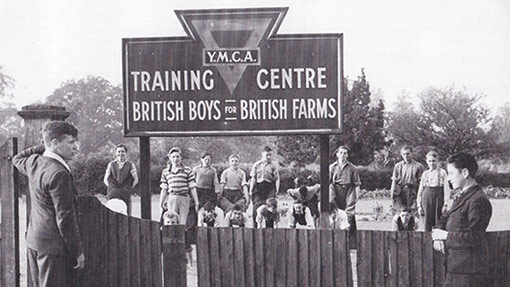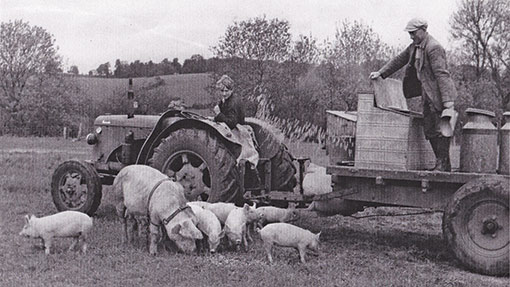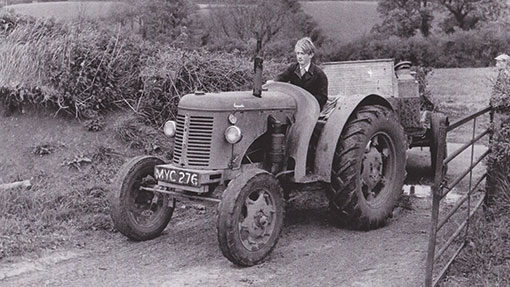‘War boys’ gather for on-farm reunion

Finding and training the next generation has always been an issue in agriculture, with the YMCA attempting to tackle it in previous decades.
Veterans of a unique agricultural programme recently got together to share their experiences, as Nick Fone reports.
The YMCA set up a scheme in 1929 to take boys from the most deprived areas of the UK and give them an insight into agriculture.
Generally running for six to eight weeks, the course would give them basic training in all aspects of farming and then potentially place them in Commonwealth food-producing nations such as Canada, Australia and New Zealand, which had lost millions of young men in the First World War and been left with a gaping hole in their labour forces.

While some struggled with the transition from urban life to the wide expanses of far-off lands, most settled, set up new lives and a good number went on to farm in their own right.
Three years on, however, the Depression had set in and there were no longer the prospects overseas. Instead, the YMCA placed boys on farms closer to home – and so the British Boys for British Farms (BBBF) scheme was born.
Young men looking to get out of deprived urban areas volunteered in their thousands. From 1932-68, more than 20,000 boys who attended the programme went on to bolster the labour force of Britain’s rapidly changing agricultural and horticultural industries.

One of the training centres was at North Cadbury Court, Somerset, where the Langman family hosted 30-plus boys at a time, sleeping in a dormitory in the main house.
Eighty years later, many of the original scheme trainees have passed on, but hundreds are still thought to be involved in farming.
Following appeals in Farmers Weekly, a reunion was recently hosted by the Montgomery family (Langman descendents) at Cadbury Court, where around 40 “old boys” got together to relive their experiences.
 John Mills (1953)
John Mills (1953)
Having lived in central London for the first 15 years of his life, John had little connection to agriculture, but heard about the BBBF scheme through his school careers officer.
“I arrived on the train and within three days was out working on a farm. It was the quickest way to learn, especially as we had lectures in the evenings to teach us the theory behind what we were doing during the day.
“It was a huge shock to the system, but we really enjoyed it, especially with 30 of us living together in one dormitory in the main house.”
Once he had completed his eight weeks of training, John got his first permanent job on a nearby farm and was put up by an elderly lady with strong Methodist beliefs.
“The house had no electricity and I wasn’t allowed newspapers or anything like that so I had to go to bed with a candle and the Bible if I wanted to read. For a young man it wasn’t much of a life, so I found somewhere else to lodge.”
The couple whose house he moved to had a daughter, Anne, who John eventually married. But their time together was interrupted in 1956 when John was called up for National Service in the Grenadier Guards. He was back in London – this time on ceremonial duties at Buckingham Palace.
But the call of the countryside (and Anne) was strong and after his obligatory two years was up, John moved straight back to North Cadbury, securing a job with farmhouse cheesemaker WHC Longman.
“I started at the bottom, feeding calves, then milking and tractor-driving before eventually becoming farm manager. When I started in 1958, we had 130 cows and 14 men. By the time I retired in 2000, we had 400 cows, 350 followers and six men.
“If it wasn’t for the BBBF scheme, I would never have made it into farming and would probably have been stuck in London. But instead I’ve had a fantastic life in Somerset.”
 Victor Davis (1961)
Victor Davis (1961)
Like many children growing up in urban areas, Victor had had little to do with animals and was scared on the rare occasions he encountered livestock in the countryside surrounding his hometown of Poole in Dorset.
“But one year on Scout camp I got the chance to get up close to the animals. I quickly changed my thinking and realised that farming was actually what I wanted to do.
“I went back to school and told the careers officers to get me on the YMCA BBBF course. So in 1961 I showed up at North Cadbury.”
Victor quickly took to the work and, being on the course during summertime, was keen to take advantage of the opportunity to earn a few extra shillings on his free days.
“We got Sundays off to go to church and recover from the hard labour that we weren’t used to. But I was keen and often went back to the farm to help with the haymaking. The extra money was great, but it was the massive cream teas that were the real draw – YMCA rations were hardly gourmet!”
On leaving the course, Victor got a job with Wyke Farms near Bruton, where new owner Tom Clothier bought him a horse and taught him the art of cheesemaking.
After three years on the farm and with day-release courses in nearby Wincanton, Victor went on to Cannington College near Bridgwater for a general certificate in Agriculture.
“After that, I felt I needed to broaden my horizons and set out on my own version of the Grand Tour with the intention of visiting Canada, New Zealand and Australia.
“I docked in Quebec and went to visit relatives in Toronto – but never got any further than that. I got a job on a pig and arable farm near Sarnia in Ontario.
“I worked there for four years but one day I slipped and fell from a grain silo and was in a wheelchair for months – that was the end of my career in practical farming.”
After recovering from his accident, Victor got a job as a civil servant in British Columbia helping to set up the agricultural land reserve in the 1970s to secure areas for food production. He is now retired and living in Vancouver.
 John Robbins (1964)
John Robbins (1964)
With an artist father and his mother working at the BBC, John Robbins grew up in Chelsea. But his heart lay in the countryside.
The family would go for holidays to the Isle of Sheppey in Kent, where John spent much of his time chatting to local farmers.
“I was hooked on farming, but hated school. I got one GCE, which was enough to get me on the BBBF scheme. The farmer I worked for – David King-Brain – was a hard task-master, but it was character-building. I learned to drive a tractor and the same old Grey Fergie is still on the farm today.”
After his time in Somerset, John spent six months on a mixed farm in Denmark before returning to Cannington for a general certificate in Agriculture.
Following that, he worked as a relief milker before signing up with the VSO for 15 months’ work with vets in Tanzania. “I loved Africa, but knew I wanted to be back in Britain so in 1969 returned to a job as a herdsman on a farm in Sussex.
“After 18 years doing that, I went on to selling milk powder, cattle feed and veterinary supplies and at the same time volunteered as a Samaritan. “That led me to thinking about doing more of that kind of work and I changed direction completely, ending up helping to run children’s homes.”
Having done that for a decade, John retired and set up his own catering business. His voluntary work continues as a magistrate.
“If it wasn’t for the BBBF scheme I would never have done what I have – it feels good to be giving something back when you’ve benefited from other people’s good work yourself.
“Coming back to North Cadbury has been a real experience and driving the same old tractor around the orchards at the King-Brains has been fantastic.”
 Michael Trevarrow (1952)
Michael Trevarrow (1952)
His childhood in Cornwall prepared Michael Trevarrow well for life as a BBBF boy. His grandparents had a small farm near St Just where he sheltered during the First World War and his father was a stockman, before going to work in the dockyards in Devonport.
“I had a bit of a head start on the others at Cadbury Court because I’d been working on the farm for a while. That said, at 15 years old, it was still a big shock to the system.
“It was my first real time away from the family. But I loved it. We got up at 7am, had breakfast and then cycled to the farms we were working on with our Marmite sandwiches. However, I didn’t need them – the family I worked for made fantastic meals so the pigs did pretty well out of the packed lunch!”
During training, Michael had the opportunity to work at the Royal Devon Show, and it was there that a farmer from close to Exeter enquired with the YMCA about the availability of labourers and Michael was put forward.
That set him up in his first permanent job, looking after a herd of pedigree Guernseys for two years. That experience qualified him for a place at Bicton College where he studied a general certificate in Agriculture.
Following that, he worked for a number of dairies across the South West, with the YMCA helping him find jobs along the way. Finally, he settled on a large dairy, beef and arable farm close once more to North Cadbury where he stayed for 40 years before retiring.
Finding and training the next generation has always been an issue in agriculture, with the YMCA attempting to tackle it in previous decades.
See also: How tractors helped to win the war
